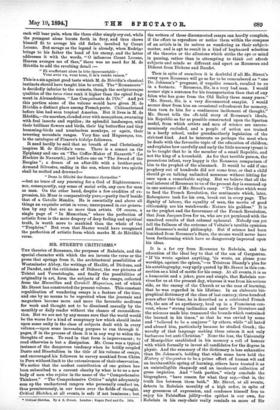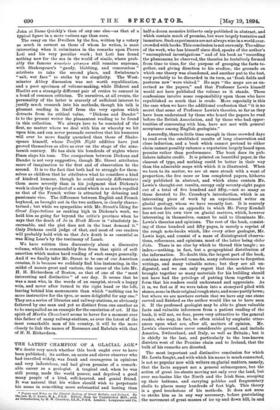MR. STREET'S CRITICISMS.*
THE theories of Rousseau, the purposes of Rabelais, and the special character with which the sea invests the verse or the prose that springs from it, the architectural possibilities of Westminster Abbey, the writings of Hazlitt, of Dickens, and of Daudet, and the criticisms of Diderot, the war pictures of Tolstoi and Verestchagin, and finally the possibilities of originality in art, form the subjects of the essays, collected from the Macmillan and Cornhill Magazines, out of which Mr. Street has constructed the present volume. This constant republication of wandering essays is a feature of the time, and one by no means to be regretted when the journals and magazines become more and more the favourite mediums for work and thought not to be dismissed casually by the monthly or daily reader without the chance of reconsidera- tion. But we are not by any means sure that the world would be the worse for a kind of sumptuary law which should insist upon some unity in the class of subjects dealt with in every volume,—upon some increasing purpose to run through it pages, if in the process of them it is in any way to widen the thoughts of men. To read in that form is improvement ; to read otherwise is but a dissipation. Mr. Cross was a typical instance of the dangerous tendency when he boldly coupled Dante and Bimetallism in the title of his volume of essays, and encouraged his followers to survey mankind from China to Peru without limit to the extensiveness of their observation. We notice that the modest contribution of one guinea has been subscribed to a current charity by what is to us a new body of men who rejoice in the name of the "Comprehensive Thinkers." "The Comprehensive Critics" might adequately sum up the tuachartered rangers who personally conduct us, thus promiscuously, in our tours over the fields of thought. Critical Sketches, at all events, is safe if not luminous ; but * Critical Sketches. By A S. Street. London : Kogan Paul and Co. 1894. I
the writers of these disconnected essays can hardly complain, if the effort to reproduce or notice them within the compass of an article is in its nature as wandering as their subject- matter, and is apt to result in a kind of haphazard selection of the theories or the allusions which strike the eye or mind in passing, rather than in attempting to think out afresh subjects and minds so different and apart as Rousseau and Diderot from Dickens and Daudet.
Then in spite of ourselves it is doubtful if all Mr. Street's essay anon Rousseau will go so far to be remembered as "one Dr. Johnson's" pregnant, if unpolite remark, recalled to us in a footnote. "Rousseau, Sir, is a very bad man. I would sooner sign. a sentence for his transportation than that of any felon who has gone from the Old Bailey these many years." "Mr. Street, Sir, is a very disconnected essayist. I would sooner draw from him an occasional refreshment for memory, than turn to him for a continuous incitement of thought" Mr. Street tells the oft-told story of Rousseau's ideals, his Republic as far as possible constructed upon the Spartan model, from which artists and men of science are uncere- moniously excluded, and a people of action are trained in a hardy school, under grandmotherly legislation of the strictest kind. And he interests us perhaps the most when he deals with the favourite topic of the education of children, and explains how carefully and early the little nursery tyrant is to be taught that he is the member of a small Republic, and not the king of a household. As for that terrible person, the precocious infant, very happy is the Rousseau comparison of him to the prophet of the almanack. It would be odd if one prophecy out of hundreds did not come true, or that a child should go on talking unlimited nonsense without hitting for once upon a remarkable saying. But we believe that all the real interest of Rousseau to us of the present day is summed up in one sentence of Mr. Street's essay. "The ideas which went to feed the French Revolution, the sentiments which, later, Robespierre took for his own, break out in every page. The dignity of labour, the equality of man, the merits of good citizenship are his watchwords : Nature his goddess." It is as the prophet and the forerunner of the French Revolution, that Jean Jacques lives for us, who are yet perplexed with the unsolved results of that colossal upheaval. Nobody can yet tell the fullness of the outcome of Voltaire's terrible cynicism and Rousseau's social philosophy. But if science had been banished from Rousseau's State, the means would never have been forthcoming which have so dangerously improved upon his ideas.
It is a far cry from Rousseau to Rabelais, and the education of the ideal boy to that of the son of Gargantua. "If 'tis wrote against anything, 'tis wrote, an please your worships, against the spleen,"—is Tristram Shandy's plea for his autobiography, very aptly quoted by Mr. Street in this con- nection as a kind of motto for his essay. At all events, it is as a humourist and a joker, pure and simple, that Rabelais sur- vives for us at the present day, whereas it was from his serious side, as the enemy of the Church or as the man of learning, that he was regarded in his lifetime. In an elaborate bio- graphical dictionary of the close of last century, three hundred years after this time, he is described as a celebrated French wit, the son of an apothecary, bred up in a Franciscan con- vent, whose "strong inclination and taste for literature and the sciences made him transcend the bounds which restrained the learned in his times," so that he was envied by some and "believed to be a conjuror" by others, while "all hated and abused him, particularly because he studied Greek ; the novelty of that language making them esteem it not only barbarous but anti.Christian." None the less, the University of Montpellier established in his memory a roll of honour with which formally to invest all candidates for the degree in physic. And the summary of the dictionary is less exhaustive than Dr. Johnson's, holding that while some have held the History of Gargantua to be a prime effort of human wit and an inexhaustible spring of learning, others have treated it as an unintelligible rhapsody and an incoherent collection of gross impieties. And "both parties," wisely conclude the biographers, "have reason for what they say,—that is, the truth lies between them both." Mr. Street, at all events, detects in Rabelais morality of a high order, in spite of any grossness of expression, and confesses himself free to enjoy his Falstaffian jollity—the epithet is our own, for Rabelais in his easy-chair really reminds us more of Sir
John at Dame Quickly's than of any one else—as that of a typical figure in a more various age than ours.
The essay on the Dwellers by the Sea, written by a votary as much in earnest as those of whom he writes, is most interesting when it culminates in the remarks upon Pierre Loti and his very peculiar work ; but Loti has found nothing new for the sea in the world of simile, where prob- ably the famous cilolpiA,u8i, segXesa pea still remains supreme, with Shakespeare's "gaudy, blabbing, and remorseless" attribute to take the second place, and Swinburne's "salt, wet face" to strike by its simplicity. The West- minster Abbey discussion was not worth republication, and a poor specimen of volume-making, while Diderot and Ilazlitt are a strangely different pair of critics to connect in • a bond of common criticism. To ourselves, at all events, the personality of the latter is scarcely of sufficient interest to justify much research into his methods, though his talk is pleasant reading in itself from the very egoism which detracts from its critical value. "Dickens and Daudet" is to the present writer the pleasantest reading to be found in this collection. We always love to be reminded of the first, no matter where we deal with him or whereby we hit upon him, and can never persuade ourselves that his humours will ever be more finally quenched than those of Shake- speare himself, whose Twelfth Night oddities have just proved themselves as alive as ever on the stage of the nine- teenth century. He has slain his hundreds of nights where Ibsen slays his tens. The comparison between Dickens and Daudet is not very suggestive, though Mr. Street attributes more of imagination to the first and of observation to the .second. It is to the fact that both had to struggle for them- selves as children that he attributes what he considers a kind -of kindred humour, though he could scarcely differentiate them more severely than in his judgment that Dickens's work is clearly the product of a mind which is as much repelled as that of the French writer is attracted by debasing and passionate vice. The difference between English and French boyhood, as brought out in the two authors, is clearly charac- terised ; but while we sympathise with Mr. Street's liking for great Expectations as ranking high in Dickens's work, we hold him as going far beyond the critic's province when he says that the death of Jo in Bleak House is "absolutely in- excusable, and the plot does not in the least demand it." Only Dickens could judge of that, and most of our readers will probably hold with us that Jo's death is as essential as was King Lear's by the testimony of Lamb.
We have written thus discursively about a discursive volume, which is commendably free from that spirit of self- assertion which makes hard reading of such essays generally. And if we finally infer Mr. Street to be one of our American cousins, it is because we suddenly find him instancing, in the midst of names great and various, the career of the late Mr. H. H. Richardson of Boston, as that of one of the "most interesting and distinctive" of our day. It seems that he was a man who, in the words of an essayist, struck a happy vein, and never after turned to the light hand or the left, leaving behind him monuments than which "nothing can be more instructive for the tyro, or more delightful for any one." They are a series of libraries and railway-stations, so obviously fathered by one man and yet so distinct from one another as to be unequalled as an example for the emulation of art. If the spirit of Martin Chuzzlewit seems to hover for a moment over this father of many railway-stations, as over the latest of the most remarkable men of his country, it will be the more closely to link the names of Rousseau and Rabelais with that of H. H. Richardson.







































 Previous page
Previous page